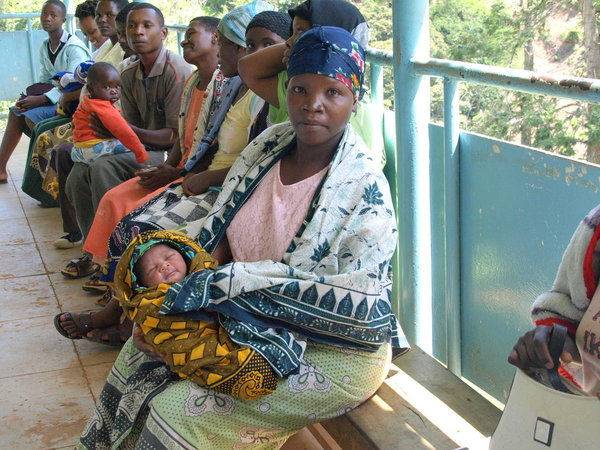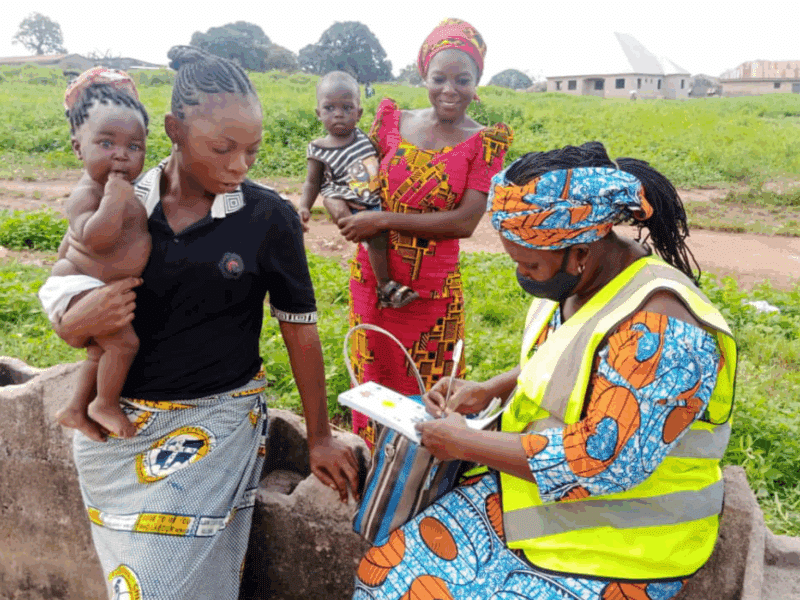An evidence-based advocacy program in Tanzania, led by the Johns Hopkins Center for Communication Programs, used data outlining the high costs of paying for health care for pregnant women and young children to convince the nation’s leading private health insurer to begin covering the costs of modern contraception.
The success of the Advance Family Planning (AFP) advocacy project could be a model for how to engage more private companies in family planning while reducing health care costs at the same time, CCP and the insurer AAR suggest in an abstract being presented at the International Conference on Family Planning, November 12-15 in Kigali, Rwanda.

Mothers wait to see a midwife for vaccinations and health education tips at a postnatal clinic in Northern Tanzania. © 2012 FELM, Courtesy of Photoshare
“You have to invest now by providing contraceptive methods and family planning counseling in order to reap the benefits later,” says Halima Shariff, who leads CCP’s family planning advocacy efforts in Tanzania. “Not only can increased access to modern contraception reduce the stubbornly high fertility rate in Tanzania, but also it can reduce maternal and child mortality associated with births spaced too closely together.”
In Tanzania, private medical insurance doesn’t typically cover family planning because these services are offered free of charge in public facilities. But women have complained about the quality of services, overcrowding, long waiting times and unexpected charges at public facilities despite the fact that family planning, maternal and child health are free of charge by policy. As a result, more and more women who can afford it prefer to access these services at private health facilities.
The move by AAR has “really opened up the access doors to those clients,” Shariff says.
Over the past 15 years, the rate of modern contraceptive use in Tanzania has grown slowly, one percent annually from 22 percent in 2005 to 32 percent in 2015. On the other hand, the fertility rate has almost stagnated with 5.4 children per woman in 2010 to 5.2 in 2015. AFP’s goal is to increase access to voluntary, high quality family planning through more investments in this area.
Since 2013, CCP has worked closely with AAR to encourage the insurer to cover family planning in their health benefit package. The AFP project analyzed the medical expenditures of AAR – the nation’s largest private insurer – relating to the health of pregnant women and children under five years old. They found that from 2013 to 2015, maternal and child health costs were high and rising. In 2013, $10 out of every $100 in claim costs incurred by AAR were maternal health. By 2015, those costs rose to $13. Comparatively, the costs to provide contraception and counseling ranged from less than $1 to $9 per woman.
This evidence convinced AAR in 2016 to include family planning in its health benefit package. Prior to that, AFP helped AAR incorporate family planning in its Wellness Services Program, an educational and counseling outreach program for AAR clients as well as communities across the country. AAR’s wellness teams received training from AFP on how to explain the benefits of and address myths and misperceptions about family planning to clients.
“AAR has been a private sector champion for family planning access,” Shariff says. “They’re happy about it because they know that this investment will avert the ever-rising costs of maternal and child health care. And we are pleased because this means more women now have access.”
The number of corporations who registered for the family planning package grew from 35 in 2016 to 119 in March 2018. There has been increased interest from corporations in adding the benefits and from other insurers who are curious about the program. While a majority of people in Tanzania use public insurance – which covers family planning for free – an increasing percentage of people have private health insurance coverage.
While there is no data yet on whether these efforts have reduced unintended pregnancies or the fertility rate in Tanzania, Shariff says she believes that those results will show that access can make a difference in family planning uptake.
“Evidence-based advocacy really works. We have increased access for AAR’s clients who couldn’t easily access family planning,” she says. “Indeed, advocacy takes time to make an impact. Our intention was to create something sustainable as opposed to a one-time contribution, and we think we have.”





